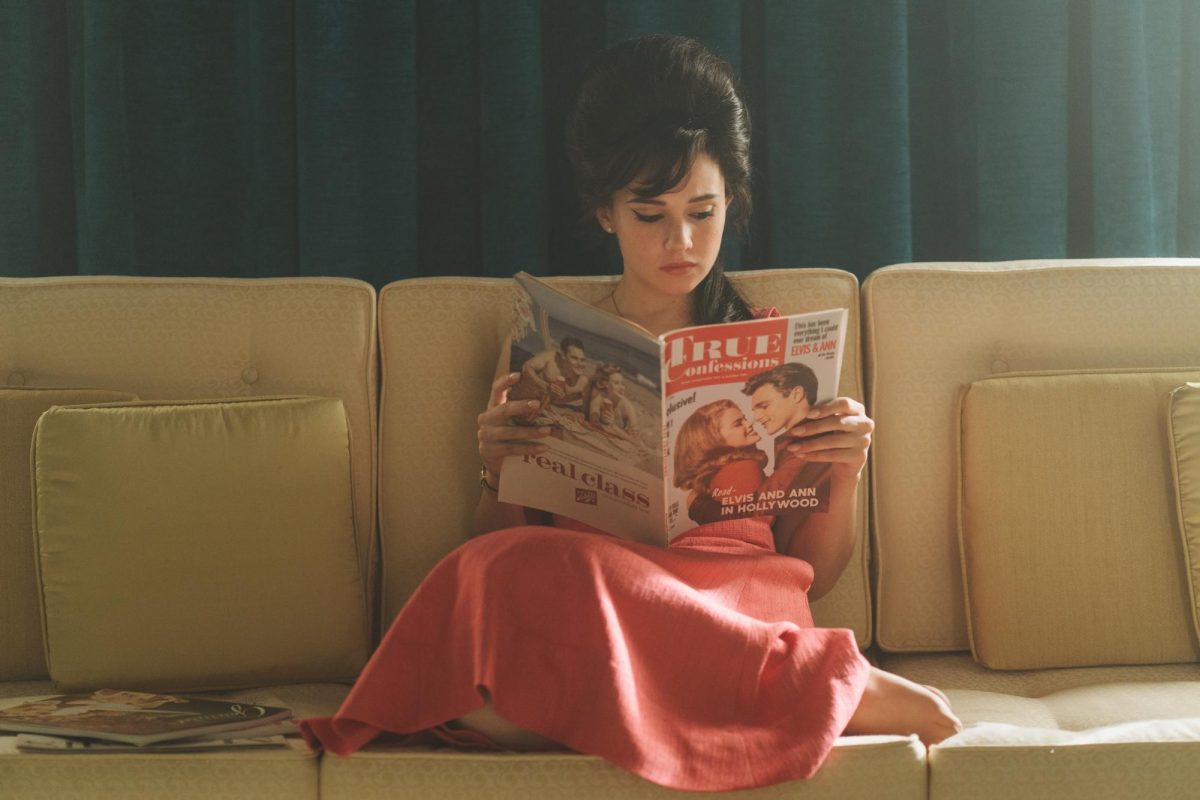It was like a movie being played in fast-forward. It’s not a story about people. It certainly isn’t a story about Priscilla. It’s just “event, close-up on Priscilla, flashforward, event” and on and on until the credits roll and everyone in the room goes “What, really? That’s it?”
“Priscilla” (2023), directed and written by acclaimed director and writer Sofia Coppola, is the story of Priscilla and Elvis as told by Priscilla, played by Cailee Spaeny. It follows her from age 14 and meeting Elvis to 28 and divorcing Elvis (Jacob Elordi). It goes through important beats in their relationship, including the birth of their daughter Lisa Marie, and the various troubles in their relationship.
Spaeny was an inspired choice. She’s 25 years old but she looks and sounds 13, which made every interaction between them feel incredibly gross as intended. Elordi plays the same role he always plays which is “hot but terrifying.” Half of his dialogue was indecipherable. The tag team of Priscilla, who says about three words-per-scene, and Elvis, who spoke in what can only be described as Southern gibberish, created a David Lynchian experience, so there’s that for those who are interested.
None of the beats that are meant to evoke emotion do anything. It’s just actors going through scenes. Elvis throws a chair at Priscilla’s head — it misses, thankfully — and it doesn’t seem to matter. Was that on purpose? Is it supposed to say that Priscilla brushed off her abuse? That she was desensitized to the violence? Maybe. But it’s not lingered on. She shows no fear of him after that. It changes nothing. She eventually divorces him after he tries to force himself onto her. Fair, she should leave him, but quick question, why now? Why is this something that she could no longer tolerate? He’s ignored her boundaries and her wishes when it came to sex before, why does she suddenly have the strength to leave? She never speaks to anyone, never sees anything that would change her mind. Why does Priscilla do the things she does? How does she feel about things beyond “pleased” or “meek?” You will go to your grave wondering these things. At this point, that is not the mark of a clever film, it’s the mark of a poorly made one.
“Priscilla” is not offensive or inept. It’s boring. It claims to have something to say yet spends 110 minutes saying nothing. There are many things it could have been saying, but the movie spends so little time on anything that it’s hard to understand what actually mattered in the end. If one has a grasp on the concept “24-year-olds should not be in romantic relationships with 14-year-olds,” then that’s it, they have grasped the concept at the core of the movie. That’s the groundbreaking message it’s pushing. There may have been more that Coppola wished to say. It could have been a story about banality of abuse and manipulations, which it very easily could have been considering how bored Priscilla seems even when she’s being hurt. Priscilla repeats laments of boredom again and again and it doesn’t seem like that boredom is used particularly well. There’s no emphasis on Priscilla wasting away or looking languid, nothing is strong in this movie.
The visuals, which are Coppola’s defining touch, are fine, not particularly beautiful. The ’60s pastel aesthetic is always appreciated and Priscilla’s looks are frothy and sweet, but it’s not all that heightened though. This may have been the attempt to ensure a more grounded story, but all it does in the end is compound a feeling of shallow boredom. Again, that may have been intentional, but the movie also doesn’t say anything with that boredom. It’s not a clever narrative tool, it just feels like the movie was made because Coppola hadn’t made a movie in a while and she thought “Might as well get one out, make sure I don’t get rusty.” No particularly interesting camera moves save for one moment where the camera zooms out of Spaeny’s face, framed by a golden window, and blue flower bushes come into view. The only reason that deserves a mention is because it’s reminiscent of ’60s camera tropes and it was nice to notice. There isn’t much homage in ’60s filmmaking in the rest of the movie, so it’s up in the air as to whether that was on purpose. However, the soundtrack is fantastic; it’s all ’60s love song goodness and truly one of the few highlights of the movie.
Coppola’s intent is inscrutable, and normally that’s exciting for art film viewers, but this movie is just tedious by the end. The last scene is anti-climactic. If every choice here was artistically motivated, it can only be presumed that Coppola intended to make the anti-Coppola movie. She knows what’s expected of her and she went to subvert it. Coppola movies have pretty distinct imagery. Well now, it’s bland and faded in a way that slips off the brain. Coppola movies have distinct female characters. Whoops, Priscilla is barely a character in the movie. She is the faded outline of a girl on wallpaper; bland but faintly person-like. Coppola movies are movies? Instead, you spent 10 dollars to have someone’s antique lamp flashing in your eyes for two hours.





















Rae • Dec 24, 2023 at 8:58 am
This describes the film perfectly. It was like a poorly made for tv movie. No conversations, no in depth look at anything. Just events. I wasted money🫤
Janice Jones • Nov 18, 2023 at 8:19 pm
Yuk! I won’t be spending 💰 to go see that trash!!